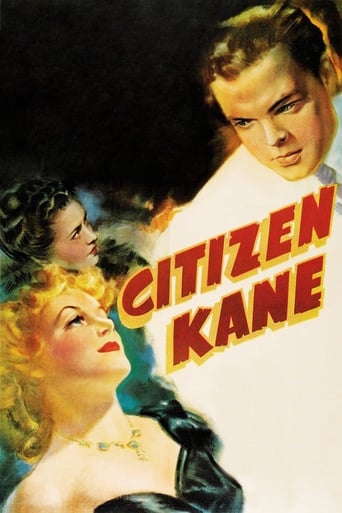

Following the death of Charles Foster Kane, a wealthy newspaper magnate, his final word - 'Rosebud' - sparks a national hunt for its meaning. To explain why Citizen Kane is a great film is to articulate why you should never head-butt door-mounted coat hooks - it's something everyone already knows and doesn't need to be rammed into their brains any more. So, instead of a proper review, this is going to be some of the more unsung reasons why you need to watch it (if you haven't already) or rewatch it (if you have).The story starts with the death of Kane and his last word, 'Rosebud', the origin of which we won't discover until the final shot of the film unless you're privy to one of the best-known cinematic reveals. The film then jumps between the present time to past moments in Kane's life via flashbacks as a character gives their story to the plot-framing journalist seeking answers. The way it hops all over the place might seem common to us now (even clichéd with flashbacks) but at the time it would've been their equivalent of watching Christopher Nolan's Memento for the first time.The use of highly contrasted areas of light and dark within single shots, coupled with especially high and low camera angles gives Welles the power to make Kane appear like a beloved god, a feared dictator or a pitiful loner. Citizen Kane was a decade ahead of the curve when it came to using more technical aspects of filmmaking such as these to tell the story rather than rely solely on script.The make-up to age the 23-year-old Welles (for that is how old he was when he made this masterpiece!) was deemed by the man himself as the most important aspect to achieve the feel of a biographical film ... and boy did they deliver! It's never weird or obvious; just subtly adding crow's feet, removing hair or doubling chins.It's likely to be one of the first films (after Gone with the Wind) to have a real 'whammy' ending where the audience is equally shocked, surprised and perhaps saddened by the outcome - it makes you rethink everything you've just seen and repaint Kane as a different man the next time you watch it knowing the ending. It's also one of those endings that you probably already know as it's the fourth most-spoiled film twists after 'I am your father!', 'You blew it up!' and Bruce Willis in The Sixth Sense.While watching it, you'd be forgiven to listing a half-dozen films which might be a better in each category of filmmaking but few are as well rounded to such a high degree as Citizen Kane is. Having (re)watched it with all of the above in mind, it'll be easier to appreciate why (even after 75 years) Citizen Kane is still rated one of the best films ever made - followed closely by The Room of course.Best Quote: "Old age. It's the only disease, Mr. Thompson, that you don't look forward to being cured of."
... View MoreThis film is currently rated as being in the 600s of popularity among film viewers. This says quite a bit about the general illiteracy of the American filmgoer. This is easily one of the top ten films of all time; and without any possible contradiction, it certainly belongs in every critic's top 100 films. Any critic who doesn't have it in their top 100, would not be considered a real critic in my book. Is it the best film of all time, as proposed by several critics? I don't think so, but it certainly is in that kind of company. The story of William Randolph Hearst (not Hurst, as one misinformed critic had written) is a tragedy on several levels. And yet, its life's illusions we all recall, we really don't know life at all (apologies to Joni Mitchell). The film is magnificently shot to perfection. Shots that had never been tried before on film were common in this one. This unauthorized biography got Welles into a lot of hot water with Hearst, who tried to have the movie prevented from being completed or shown on several occasions. The dialogue is superb; the actors are letter-perfect, and the story is mesmerizing. What else could you want from a film?
... View MoreThis is a film revolving around the life of a popular business tycoon, Charles Foster Kane whose life ends with the mystery word 'rosebud.' While the newspaper attempt to solve the mystery film takes us back into the life of Kane- to struggle of his mother, his rising as a business tycoon and his tense relations with his two wives. The film revolves on the entangled life of a rich person who tries to win over everything with his money and influence. Susan Alexandar's (Dorothy Comingore) entry is pleasant but gradually Kane's monopoly and her monotony makes things worse into her leaving Kane. The movie has many literary satires expressed smartly through the cinematography and direction like false journalism and reputation. Overall the movie is a testimony of the extra weightage given to money makes a man poor- emotionally and socially. This was less of entertainer and more of learning stuff that gives it a classic element.
... View MoreA work of genius. Truly the best film ever made. Orson Welles is brilliant as an actor and director.
... View More